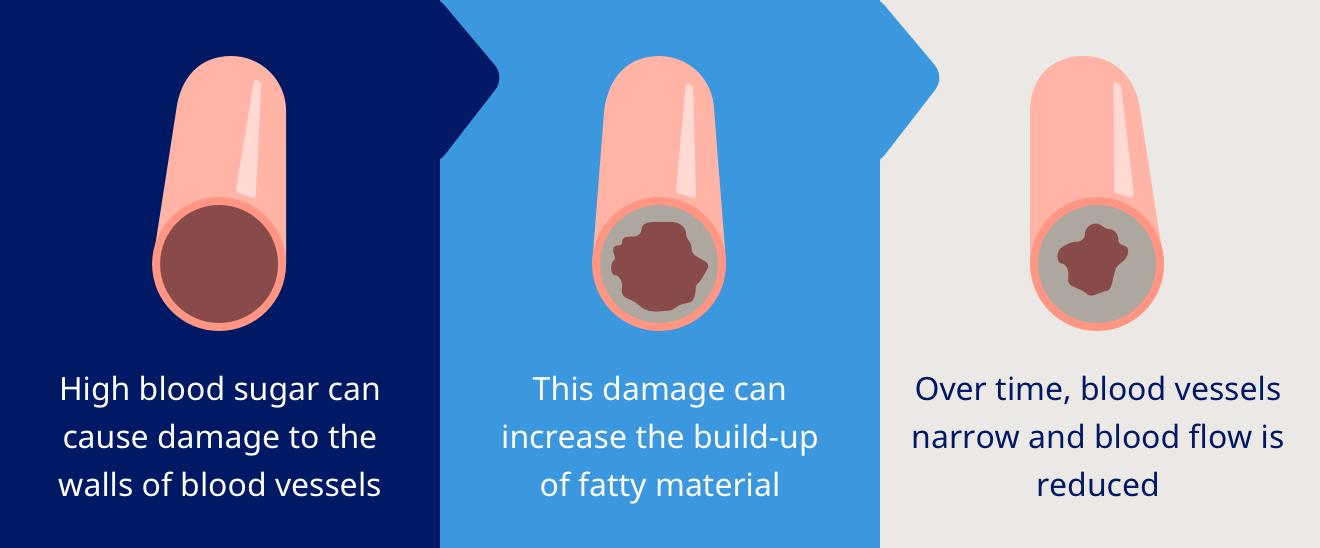
Living with diabetes
How do you manage your lifestyle when it comes to diabetes? Whether it be nutrition or exercise, we have gathered tips and articles to help you manage your diabetes.
Are cardiovascular disease and heart disease the same thing? In short, no - cardiovascular disease is the general term for conditions affecting the heart (cardio) or blood vessels (vascular) and covers all heart and circulatory diseases, including: 4-6
Heart disease is another broad term used to describe a range of disorders affecting your heart, and these include: 4
There’s a strong correlation between both cardiovascular disease and diabetes and heart disease and diabetes. In both, blood vessels narrow and the amount of oxygen-rich blood reaching the body’s vital organs is severely reduced. 7
The blood pressure rises, and your heart must work harder to move blood around the body. Over time, this can cause lasting damage to the heart, resulting in cardiovascular disease. 7
Both type 1 and type 2 diabetes have established risk factors for cardiovascular disease. 8
You’ll likely already be familiar with the symptoms of type 2 diabetes, and this knowledge will come in handy when exploring the correlation between type 2 diabetes and cardiovascular disease.
As a quick refresher, note that type 2 diabetes causes high glucose levels in the bloodstream. This can quickly lead to the damaging of blood vessel walls, an increase in fatty materials and the reduction of blood flow. This kind of build-up can starve the heart of oxygen and nutrition, potentially resulting in severe heart conditions, strokes, and high blood pressure. 7

The most common symptoms of cardiovascular diseases and something you should look out for as a patient with type 2 diabetes, include: 9
When it comes to managing cardiovascular disease, preventative efforts are key. Patients with type 2 diabetes should consult their health care professional to establish a management plan to reduce their risk of cardiovascular disease. These may include lifestyle changes, medications and risk factor interventions. Note, every condition is different and reducing the risk of cardiovascular disease will require a different approach from person to person.
Lifestyle factors can impact the risk of cardiovascular disease. Lifestyle factors that alleviate narrow or clogged blood vessels, and increase the risk of cardiovascular disease, include: 9-14
Clinical evidence shows that a cholesterol level reduction may lower the mortality rate from cardiovascular disease.10
A nutritionally limited or poor diet can impact cardiovascular risk factors such as blood pressure and cholesterol.
Smoking is a significant risk factor for cardiovascular disease. Tobacco is known to damage and narrow blood vessels.
Studies have shown excessive alcohol consumption is associated with cardiovascular disease.
Being overweight or obese is directly linked to an increased risk of cardiovascular disease.
Managing lifestyle factors by considering more exercise, eating a balanced diet, weight management, and cutting out excessive drinking and smoking may be helpful to managing your risk of cardiovascular disease.
While lifestyle changes are important for reducing the risk of cardiovascular disease, it is important that you continue to monitor your blood sugar level carefully and manage your medication with consultation of your health care professional.

